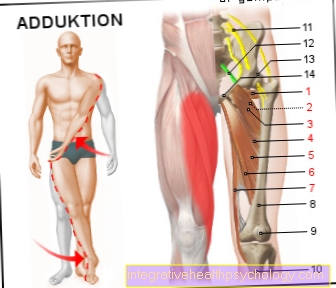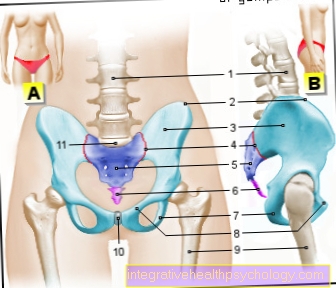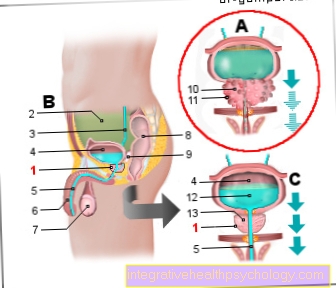Bleeding gums from stress
Bleeding gums as a symptom

The bleeding gums itself is basically not an independent disease. Rather, the occurrence of bleeding of the gums is a widespread symptom, which can be an expression of various underlying diseases. In the majority of cases, those affected notice bleeding gums during or after brushing their teeth. Strong rubbing movements of the toothbrush irritate the gums, which have already been attacked, and lead to the smallest injuries and bleeding.
Read more on the topic: What's the best way to stop bleeding gums?
In most cases, a simple inflammation of the gums (lat. Gingivitis) the cause of the bleeding gums. For most of those affected, the inflammatory processes are the direct result of irregular or simply improper oral hygiene. Especially in hard-to-reach places (between the teeth or at the end of the rows of teeth) plaque builds up, bacteria colonize and plaque builds up. On the basis of the food residues and the bacterial pathogens that persist in them, the gums are attacked and irritated. Gingivitis is also indicated by swollen, bright red gums.
Search for the cause
In addition, more serious diseases can lead to bleeding gums. In particular, inflammatory processes in the area of the periodontium can have long-term consequences. If a suitable therapy is neglected, there is a risk of receding gums and the loss of actually completely healthy teeth. Should bleeding gums follow a trauma (e.g. an accident or fall), a fracture in the area of the bony jaw should be considered and a doctor should be consulted as soon as possible.
In addition, diseases of the Tooth root Provoke bleeding of the gums. Since bleeding gums are just a symptom, the Underlying disease be diagnosed promptly. A visit to the dental practice is therefore unavoidable. Only on the basis of an extensive Search for the cause can be an ideal therapy and the bleeding gums can be effectively treated.
Bleeding gums from stress
Many patients notice that there is increased bleeding gums, especially during or after particularly stressful phases in life. Of course, in these cases too, there is a possibility that poor oral hygiene will trigger bleeding of the gums. In fact, poor oral hygiene is by far the most common reason for bleeding gums in these patients too. Nevertheless, the “stress” factor should not be completely disregarded when looking for the cause.
If the organism suffers from stress for a while, the tissue hormone cortisone is released. This hormone leads to a short-term stimulation of all those organs that are required to cope with potentially dangerous situations. Under stress, the heart rate is increased and breathing increased. In addition, at the beginning of the stress reaction, the organism reacts with a temporary stimulation of the immune system. However, after a certain period of time, i.e. with prolonged stress, a cortisol-induced weakening of the immune system occurs. The tissue hormone mediates the suppression of various immune cells, which are however essential for the smooth running of the immune reaction. People who suffer from stress over a long period of time have been shown to be more susceptible to infections and chronic diseases. The gums and especially the gums suffer from this situation. Even with adequate oral hygiene, which takes into account the daily cleaning of hard-to-reach areas, local bleeding gums can occur. In patients who practice less careful oral hygiene, stress-weakened immune systems can have devastating effects on teeth and gums.
Also read our topic: How can you reduce stress?
The large number of bacteria that persist within the oral cavity perform important tasks. In people with good oral hygiene and a properly functioning immune system, these bacterial pathogens can be kept in check to such an extent that neither teeth nor gums are at risk. If the organism is no longer able to do this, inflammatory processes are promoted. For this reason, it is important to take special care with dental care, especially in times of stress. In addition to using a toothbrush, so-called interdental brushes or dental floss should be used at least once a day. When buying a toothbrush, it is important to pay attention to the strength of the bristles. In most cases, a medium bristle thickness is the most gentle on the gums. While bristles that are too hard often scrub away the gums properly, adequate cleaning with soft bristles can usually not be guaranteed.
If you want to know about other effects of stress, read about it below: Consequences of stress


.jpg)


























